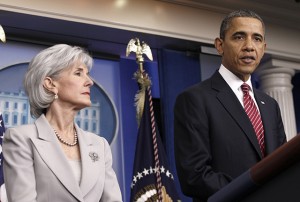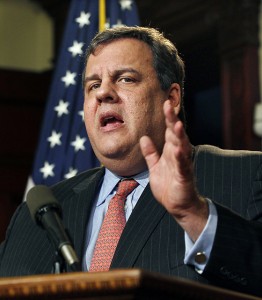Last week saw an important milestone on the road toward implementing the Affordable Care Act, a.k.a. Obamacare: Friday was the deadline for states to let the Department of Health and Human Services know whether they’d be setting up their own health care exchange, or wanted the federal government to do it for them.
The exchanges required under the ACA are online marketplaces where people needing to buy health insurance can compare the options available in their state and purchase a plan. As many as 30 million people are expected to buy health insurance through the exchanges, which are scheduled to be up and running in all states in 2014.

President Barack Obama and Health and Human Services Secretary Kathleen Sebelius in Feb. 2012. (AP Photo/Pablo Martinez Monsivais)
Many of the governors who spoke out against state-operated exchanges were Republicans, and many said they were not given enough information to submit a plan by last week’s deadline. In a statement rejecting the state option, Virginia’s Republican Governor Bob McDonnell complained about a “lack of details and certainty about the states’ ability to receive the necessary flexibility, control and funding of their own exchanges.”
New Jersey’s Chris Christie cited similar reasons for vetoing legislation that would have created a health care exchange in his state. “I will not ask New Jerseyans to commit today to a State-based Exchange when the federal government cannot tell us what it will cost, how that cost compares to our other options, and how much control they will give the states over this state-financed option,” Christie wrote.

New Jersey Gov. Chris Christie answers a question during a news conference in Trenton, N.J., Dec. 7, 2012. (AP Photo/Mel Evans)
As a director at the U.S. Department of Health and Human Services, Jay Angoff led insurance reform efforts during the first year that Obamacare was a law. He says that while the Department could have done more to communicate with governors, in many cases it was politics not policy that determined whether governors chose to create health insurance exchanges for their states.
“I don’t think that any additional guidance would have made a difference in the decisions that these governors are making. Clearly the decision to allow the federal government to operate the exchange is a political decision. It’s not based on the merits, it’s purely based on ideological opposition to the Affordable Care Act.”
In Missouri, the Republican-dominated state legislature went so far as to place an initiative on the November ballot prohibiting the Democratic governor, or any other state entity, from creating a state-run exchange and from cooperating with the federal government on an exchange — unless the governor was given permission from the state legislature or through a voter referendum. The ballot measure passed and Missouri Governor Jay Nixon was unable to apply for a state-run exchange.
Conservative governors, some of whom head America’s least-insured states, have also been resisting the ACA by opting out of the Medicaid expansion, an element of the law that, if every state opted in, would extend health insurance to 21.3 million people by 2022.
The irony of many conservative governors’ decisions to opt out of creating their own state-run health care exchange is that, by refusing to take any part in advancing Obamacare, the governors handed control of their states’ markets over to federal agencies — an action that goes against conservatives’ traditional resistance to big government.
Recognizing this contradiction, the Republican Governor of Idaho, C. L. “Butch” Otter, chose for his state to craft its own exchange. “Our options have come down to this,” Otter wrote. “Do nothing and be at the federal government’s mercy in how that exchange is designed and run, or take a seat at the table and play the cards we’ve been dealt. I cannot willingly surrender a role for Idaho in determining the impact on our own citizens and businesses.”
States that did not submit a plan to operate a state-run health care exchange by last week’s deadline can still partner with the federal government in developing an exchange. The deadline for forming that partnership is February 15, 2013.

